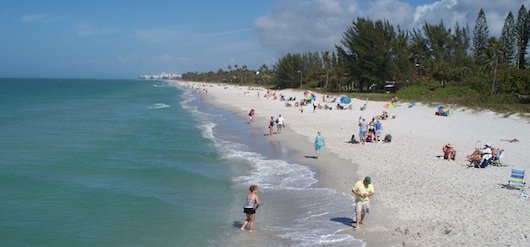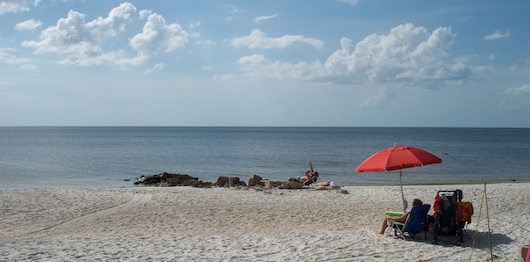Weather in Naples Florida
- Home
- Site Usage
- Weather
Naples, Florida is a beautiful city located on the Gulf of Mexico. With its warm weather, pristine beaches, and vibrant culture, it's no wonder why so many tourists flock to this area each year.
However, with great weather comes great responsibility – especially for those who live in or visit Naples. The importance of understanding and preparing for the weather in Naples cannot be overstated.
Brief Overview of Naples, Florida
The City of Naples is situated in Collier County and has a population of just over 22,000 residents. It's known for its luxury amenities like high-end shopping districts such as Fifth Avenue South and Third Street South. The area also boasts a strong arts and cultural scene with numerous galleries and theaters.

General Climate
Naples, Florida is known for its mild winters and hot summers. The climate is classified as tropical savanna, which means that it has distinct wet and dry seasons.
The wet season lasts from May through October, while the dry season lasts from November through April. During the winter months, temperatures in Naples are usually in the mid-60s to low 70s during the day, and can drop down into the 40s at night.
While this may seem chilly to some visitors, it's important to note that these temperatures are still relatively mild compared to many other parts of the country. In the summer months (June through September), temperatures in Naples climb up into the high 80s and low 90s during the day.
It's not uncommon for temperatures to reach into the mid-90s or higher on particularly hot days. The humidity during this time of year can also be quite high, making it feel even hotter outside.
Overall, Naples has a moderate climate with an average temperature range of 61°F (16°C) to 84°F (29°C). However, there have been instances when temperatures have gone above or below these averages due to changes in weather patterns.

Mild Winters
Winter is a popular time for tourists to visit Naples because of its mild climate compared to other parts of the country that experience harsh winters with snowfall and freezing temperatures. Visitors can expect pleasant outdoor conditions throughout most of winter without needing heavy clothing or worrying about shoveling snow. One perk of visiting Naples during winter is being able to enjoy outdoor activities like golfing and fishing without having to worry too much about extreme cold weather conditions.
It's also a great time for beachgoers who want a more peaceful experience without crowds. While rare occurrences are recorded each year where nighttime lows dip below freezing point especially inland areas outside the city, it should not deter visitors from enjoying the paradise-like climate of Naples.
Hot Summers
Summer in Naples is known for its hot and humid weather. This is also the time when most of the rainfall occurs. Visitors should be prepared for sudden rain showers during this season.
Summertime in Naples can also be a great time to enjoy water-based activities like swimming and boating. The Gulf of Mexico waters are warm enough for swimming during summer months.
While some may find the heat uncomfortable, there are many ways to stay cool and enjoy your summer vacation in Naples. Stay hydrated by drinking plenty of water and take advantage of indoor activities or shaded areas during hottest times of day.
Average Temperature Ranges throughout the Year
The average temperature range each year is roughly between 61°F (16°C) and 84°F (29°C). While these are just averages, it’s good to note that temperatures can go above or below these ranges depending on weather patterns.
During winter months, temperatures usually range between mid-60s to low 70s generally hovering around 68°F (20°C). Spring sees temperatures rise into low 80s till mid-may then gradually increasing through June into high 80s by July where it stays through August until September when it starts dipping a bit again.
Fall experiences gradual cooling with temperatures dropping down to low-mid 80s by November before declining further into low-mid 70s marking onset of winter season. Despite minor fluctuations throughout the year, it's safe to say that mild winters and hot summers are what you can expect from Naples' general climate pattern.
The Rainy Season in Naples, Florida
Naples, Florida is well-known for its beautiful weather. However, it can also be quite rainy during certain times of the year.
The rainy season typically starts around May and lasts until October. During this time, the frequency of afternoon thunderstorms increases significantly.
While it may seem like a nuisance, the rain brings much-needed relief from the heat and keeps the area lush and green. On average, Naples receives about 50 inches of rainfall each year.
The majority of this rainfall occurs during the rainy season. During this time, there are patterns to when rain is likely to occur each day.
Typically, morning hours are sunny and dry with clouds rolling in during early afternoon followed by thunderstorms later in the day. If you're planning a trip to Naples during the rainy season, it's important to come prepared for wet weather.
Be sure to pack plenty of lightweight clothing that dries quickly and bring an umbrella or rain jacket just in case you get caught in a sudden downpour. In addition to packing appropriately for your trip, there are also steps you can take to prepare your home or rental property for rainy season conditions.
Make sure that your gutters are clear of debris so that water can flow freely away from your roofline and foundation. You may also want to consider installing hurricane shutters or impact-resistant windows if you haven't already done so.
Keep an eye on weather forecasts during your stay in Naples and plan accordingly if severe weather is expected. If you're planning outdoor activities like golfing or beachgoing during stormy periods be sure to have a backup plan ready just in case!
Hurricane Season in Naples: Be Prepared for the Worst
Timeframe of Hurricane Season
The hurricane season in Naples, Florida, typically begins on June 1st and lasts until November 30th. During this time, the Gulf of Mexico and the Atlantic Ocean are both potential breeding grounds for these powerful storms. Hurricanes can occur at any time during this six-month period but are most frequent from August to October.
Historical Data on Hurricanes in Naples
Over the past century, there have been over a dozen hurricanes that have impacted the Naples area. In September 2017, Hurricane Irma made landfall in southwest Florida, causing widespread damage to homes and businesses alike.
This storm was one of the strongest hurricanes to hit Florida in recent history, with wind speeds reaching up to 185 mph. While not all hurricanes that impact Naples will be as severe as Hurricane Irma was, it's important to take precautions and prepare for the worst-case scenario.
Precautions to Take During Hurricane Season
There are several steps you can take to protect yourself and your property during hurricane season. One of the most important things you can do is make sure you have a solid emergency plan in place before a storm hits.
This should include evacuation routes, emergency shelter locations, and plans for communication with loved ones. In addition to having an emergency plan ready to go, it's also crucial to stock up on supplies such as food, water, medications, flashlights and batteries before a storm hits.
It's also recommended that you secure your home by boarding up windows or reinforcing doors if possible. During a hurricane warning or watch situation - stay informed through trusted news sources such as local radio stations or weather apps like NOAA Weather Radio - stay tuned until it is declared safe by local officials before venturing outside again.
While hurricanes can be scary and unpredictable, taking the time to prepare for them can make a huge difference in minimizing damage and staying safe during these powerful storms. Remember to have an emergency plan in place, stock up on supplies, and stay informed during hurricane season. By doing so, you'll be much more likely to weather any storm that comes your way in Naples.
Sea Breezes and Humidity
The Role of Sea Breezes in Naples Weather
If you've ever visited Naples, you may have noticed the frequent sea breezes that come in from the Gulf of Mexico. These refreshing winds can help cool off the hot summer days and make for ideal beach weather. The sea breeze occurs due to the temperature differences between land and water.
During the day, the air over land heats up more quickly than the air over water. This causes a pressure gradient that leads to a flow of cooler, moist air from the ocean to move inland towards warmer land areas.
The sea breeze generally starts in mid-morning when temperatures start to rise and peak by early afternoon before dying down at sunset. In Naples, these breezes bring with them moderate humidity, which can make for more comfortable outdoor activities under the hot sun.
Humidity Levels Throughout The Year
Naples is known for its warm weather year-round but with that comes high humidity levels. Between June to September, humidity levels can reach around 85% or higher on particularly humid days making it feel much hotter than it really is. It's essential to stay hydrated during this time as well as wearing appropriate clothing and sunscreen.
During winter months (December through February), humidity levels are typically lower due to cooler temperatures, averaging around 60-65%. For those who are not accustomed to high heat and humidity year-round, it's best to plan your visit during winter months when conditions are milder.
As with many coastal towns, Naples experiences a fair amount of rainfall due to its location near water sources like Lake Okeechobee and other surrounding bodies of water. Coupled with high levels of humidity throughout most of the year - Naples is definitely unique compared to inland Florida cities.
How Humidity Can Impact Your Visit
Humidity can have a big impact on your comfort levels during a visit to Naples. High humidity can lead to feelings of suffocation, fatigue, and even heat stroke if you're not careful.
It's important to stay well hydrated by drinking plenty of water and avoiding sugary drinks or alcohol that can deplete your body's water levels. If you plan on spending time outdoors during the peak summer months, consider wearing light-colored, breathable clothing that wicks sweat away from your skin.
Don't forget to apply sunscreen frequently as well - the combination of sun exposure and high humidity can lead to sunburns more quickly than you might expect. While sea breezes help cool down Naples' hot summers, they also bring with them high levels of humidity.
Visitors should plan accordingly for the weather patterns during their stay in Naples. By taking precautions such as staying hydrated and wearing appropriate clothing, you can enjoy everything this beautiful coastal town has to offer - no matter what the weather is like!
Unique Weather Phenomena
Red Tide Occurrences in Naples Waters Naples is famous for its beautiful beaches and crystal-clear waters. Unfortunately, the area is also known for a natural occurrence called "red tide." This phenomenon is caused by an overgrowth of microscopic algae called Karenia brevis.
When these algae accumulate in high concentrations, they can turn the water red and cause respiratory irritation in humans and animals. Red tide occurrences are seasonal, typically happening in the late summer and early fall.
The Florida Fish and Wildlife Conservation Commission (FWC) monitors red tide levels throughout the state, including Naples. You can stay up-to-date on current conditions by checking their website or calling their hotline.
While red tide can be harmful to marine life, it's important to note that it's not always present or widespread in Naples waters. It's still safe to swim at many of the beaches during a red tide event; however, if you have respiratory issues or notice any symptoms like coughing or sneezing, it may be best to avoid the water until conditions improve.
Swarms of Lovebugs During Certain Times of the Year
Another unique weather phenomenon that residents of Naples are all too familiar with is swarms of lovebugs. These small black insects with a distinctive red thorax are harmless to humans but can be a nuisance when they're out in large numbers. Lovebugs have two peak seasons each year: late spring/early summer (May-June) and late summer/early fall (September-October).
During these times, they tend to swarm around areas with high traffic such as highways and parking lots. One theory about why lovebugs swarm so much has to do with mating habits.
Adult lovebugs mate while flying together in pairs; therefore, there tends to be more lovebug activity around dawn and dusk when temperatures are cooler and humidity is higher. They also tend to be more active on cloudy or overcast days.
While lovebugs can be annoying, there's not much you can do to avoid them besides keeping your car windows up and washing off any residue as soon as possible. Some people swear by putting dryer sheets in their car to repel the bugs, but this hasn't been scientifically proven.
Conclusion
Naples' weather isn't just about sunshine and warm temperatures; it's also affected by unique natural phenomena like red tide and lovebug swarms. While these occurrences can be frustrating, they're also a reminder of the beauty and diversity of nature in Southwest Florida. Whether you're a resident or a visitor, it's important to stay aware of current conditions so that you can enjoy all that Naples has to offer while staying safe and comfortable.
Best Times to Visit Naples for Weather
When planning a trip to Naples, Florida, the weather is an important factor to consider. The good news is that the area boasts great weather for most of the year. Visitors can expect sunny skies and warm temperatures, but there are some months that are more ideal than others when it comes to outdoor activities like golfing, fishing, or beachgoing.
Ideal months for outdoor activities
The best time to visit Naples for outdoor activities is during the winter months when temperatures are mild and comfortable. From November through March, visitors can enjoy temperatures in the 70s and low 80s with little to no humidity. This makes it an ideal time for beachgoers who want to soak up some sun without feeling too hot or sticky.
Golfers will also appreciate the cooler temps during these months as they hit the links on one of Naples' many premier courses. In fact, many of the area's golf courses offer special rates during this time of year.
Fishing enthusiasts will also find great conditions during these months as fish move closer to shore in search of warmer waters. Snook and redfish are just a few examples of popular catches during this time of year.
Vacation planning tips based on seasonal weather trends
While winter may be an ideal time for outdoor activities in Naples, it's also peak tourist season. This means higher hotel rates and more crowded beaches and attractions.
For those looking to avoid crowds and save money on accommodations, consider visiting in late spring or early fall when hotel rates drop significantly. Summer is another popular time for families with kids out of school but be prepared for higher humidity levels and afternoon thunderstorms which can put a damper on outdoor plans at times.
Overall, Naples, Florida, is a great destination for those seeking warm weather year-round. Whether you are looking to hit the links or simply relax on the beach, there's a perfect time of year to visit to ensure ideal weather conditions.
So why wait? Start planning your trip to Naples now and experience all the beauty and warmth this charming Florida town has to offer.
Conclusion
Naples, Florida, is a wonderful place to live or visit, and its weather patterns are one of the reasons why. With mild winters and hot summers, visitors can enjoy outdoor activities like golfing and beachgoing year-round.
However, Naples is also known for its rainy season and hurricane season, so visitors should be prepared with appropriate clothing and supplies. During the rainy season from May through October, Naples experiences frequent thunderstorms and short-lived heavy downpours.
It's important to pack rain gear when traveling during these months so that you can still enjoy outdoor activities without getting soaked. Hurricane season in Naples runs from June through November, with peak activity occurring in September.
Visitors should stay informed about weather alerts during this time and be aware of evacuation routes if necessary. Sea breezes play a significant role in Naples' weather patterns as they provide an oceanic cooling effect on the land.
However, they also contribute to higher humidity levels throughout the year. Therefore, travelers should prepare accordingly by packing light clothes made from breathable fabrics to stay comfortable.
Naples also experiences unique weather phenomena such as red tide occurrences in its waters and swarms of lovebugs during certain times of the year. While these may seem like minor inconveniences at first glance, they can have a significant impact on outdoor activities.
Overall, Naples' weather patterns offer both opportunities for outdoor fun as well as potential challenges for visitors. But with proper planning and preparation based on seasonal trends outlined in this article, anyone can enjoy all that this beautiful city has to offer no matter what time of year it may be!
Current Forecasts
Here is our current forecasts in beautiful Naples Florida.
Naples
Florida Videos
Subscribe to our Youtube channel








